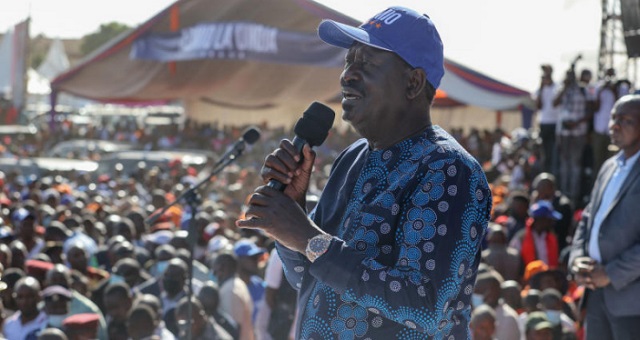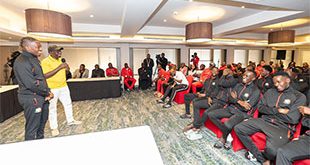
What Kenya’s fifth president means for Uganda
ANALYSIS | IAN KATUSIIME | The August 9 election in Kenya could have pretty defining moments for the country as it elects a fifth president. Two opinion polls released one week to the election put former Prime Minister Raila Odinga in pole position ahead of his rival Deputy President William Ruto.
If Raila is elected president, it will be the first time in the country’s history that someone from the ‘Luo nation’ grabs power after decades of ethnic hostility and bitter political contestation between the Gikuyu and Luo; two of some of the most influential blocs in Kenya. Politics in Kenya has historically had a tribal dimension and anxiety is peaking as Kenyans go to the polls once again.
The survey by the Ipsos group put Raila at 47% and Ruto at 41%. Prof. George Wajackoya and David Mwaure, the minnows in the race came a distant third and fourth respectively.
“Should Raila convert half of the undecided voters he will win this election first round. If Dr. William Ruto converts 100 percent of the undeclared vote, he will force a re-run,” Samuel Muthoka, the East and Horn of Africa director at Ipsos was quoted.
Another survey by Trends and Insights for Africa (TIFA) put Raila in the lead at 46.7%, with Ruto at 44.4%. Polls done earlier from two months ago also put the erstwhile opposition leader on course to win the election.
Raila under his Azimio La Umoja coalition, has the backing of President Uhuru Kenyatta who is stepping down after two terms in office. Kenyatta’s endorsement of his former rival Raila, with whom they contested against in 2013 and 2017 has been a significant factor in Raila’s fifth bid for the presidency.
Uganda is closely watching the election of its most important neighbour. Any mishap as a result of a contested election keeps Uganda on edge since Kenya is Uganda’s main trading partner and major route to the coast.
A remark by Raila while addressing voters in Nairobi incited fury when he took a jibe at Kenya’s neighbours including Uganda.
“People have continued to compare Kenya to the states around us. Look at Ethiopia, Somalia, South Sudan, Uganda and so on. Kenyans do not want to be compared to the worst in the world,” Raila said to the chagrin of social media users in Uganda.
The comment could have been a metaphor for Raila’s possible dealings with President Yoweri Museveni, should the former be elected President. Unlike outgoing President Uhuru Kenyatta who was deferential to Museveni on most occasions, Raila looks at himself as an equal or even superior to the veteran Ugandan leader with whom they are age mates at 77.
Similarly, Museveni was said to be always rooting for Raila’s opponents in Kenyan elections. According to observers, Museveni was a quiet supporter of Kenyatta when he first ran for president in 2013. In return, Museveni was the chief guest at Kenyatta’s inauguration where he famously denounced the International Criminal Court which had indicted then incoming Kenyan leader on war crimes for his alleged role in the 2008 post-election violence.
In Kenyatta’s two terms of office, he enjoyed cordial relations with Museveni as they worked on integration, trade and investment. However, Kenyatta’s chosen successor Raila, has not been known to have warm relations with Museveni.
Relations between the two are said to have soured when Raila started schmoozing with Mike Mukula, a sacked health minister who in 2007 declared his intention to run for president. Raila was gearing up for his second run then. Since then, the two have kept their distance while being the dominant players in their respective countries.
However in May, days after Raila picked Karua as his running mate, Raila paid a visit to Museveni at State House Entebbe where a press statement said they discussed regional issues and shared history of their two countries.
A year ago, Museveni was visibly close to Ruto and the Kenyan deputy president has expressed admiration for Museveni who is now seeing off the third Kenyan leader in twenty years.
However significant shifts in the election campaign has created distance and the two have not met since Ruto’s flight to Uganda for a meeting with Museveni was thwarted by the Kenyan government a year ago. It was the second time the two were scheduled to meet in a month and speculation was already fever pitch on what was on the agenda.
In other words, a Ruto win may offer a path for continuity of the relations Uganda has had with Kenya under Uhuru Kenyatta.
In his long history with Kenya where he was involved in shuttle diplomacy right from the Bush War Days (1981-1985), Museveni has always sought to cultivate good terms with the country’s leaders. The country provided a safe haven as he slipped from the Luweero jungles in central Uganda to coordinate with numerous other exiles operating out of the Kenyan capital Nairobi.
In years afterwards, he had cordial relations with Presidents; the long ruling Daniel Arap Moi and Mwai Kibaki who replaced him serving two terms from 2002-2013.
In a just released autobiography, Lee Njiru, Moi’s long serving press secretary, revealed that the former Kenyan president told him to respect Museveni, then a guerilla leader, that he was the next Ugandan president.

Deciding factors
Kenyatta’s alliance with Raila was the source of a bitter fallout with his deputy Ruto, a game changer that has been a critical part of either campaigns. Raila’s selection of Matha Karua, a prominent politician with a track record of championing Kenya’s democratic struggles, as his presidential running mate bolstered his somewhat faltering campaign.
Polls indicated Raila’s numbers went up after picking Karua, a former justice minister in May—wooing women voters and a number of youth who were disgruntled by the presence of the same players at every election cycle.
Two days after the last opinion surveys were released, Ruto addressed a presser dismissing them. “It doesn’t matter what you whether you give yourself 80% or all. It’s too late to change anything about this election,” he said. Ruto also alleged a plot to foment chaos in the election. The Deputy President said top government officials were meeting security chiefs at a location in Nakuru.
Kenyan analysts say Raila Odinga, a veteran of Kenyan politics, will win in all likelihoods.
“Odinga has a higher chance to win than Ruto. For Ruto to win, he needs to secure almost 90% win among voters from the Kalenjin and Agikuyu tribes. He will surely win among the Kalenjin, but he’ll likely poll 60-65% among Agikuyu voters,” Sitati Wasilwa, a Kenyan political and economic commentator told The Independent.
“Kenyatta and Ruto rode to victory by winning almost 90% of voters on average in these tribes. Also, Ruto’s win depends on the turnout of voters from these two communities. Anything lower than a 90% turnout will be suicidal for him,” Wasilwa said.
He also stressed that Odinga is more popular than Ruto in other regions across the country; Nairobi, Coast, South Rift, North Eastern, Western, Lower Eastern, Nyanza.
He also said the opinion polls are already pointing towards Odinga’s likely triumph over Ruto.
“Additionally, Odinga has the benefit of being closer to the state machinery; Kenyatta is the chairperson of the Azimio coalition of Odinga. Furthermore, Ruto committed a strategic blunder by picking Rigathi Gachagua as his running mate,” Wasilwa said.
“Gachagua is not a popular figure with tonnes of corruption baggage and has barely added any impetus to Ruto’s bid. Odinga’s choice for running mate, Martha Karua, has significantly boosted his bid, especially among the Agikuyu.”
Gachagua has not had the same galvanizing effect that his counterpart in Raila’s campaign, Martha Karua has had. Reports say Gachagua’s wealth is how he found his way on Ruto’s Kenya Kwanza coalition ticket as a presidential running mate.
****
 The Independent Uganda: You get the Truth we Pay the Price
The Independent Uganda: You get the Truth we Pay the Price




ok. Thanks for the information. God bless KENYANS, I wish our neighboring nations to be in peace and freedom. Amen